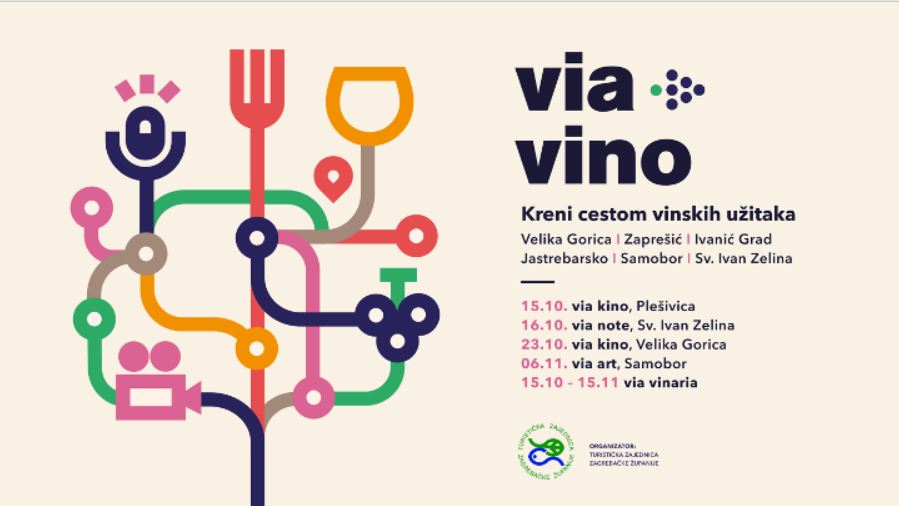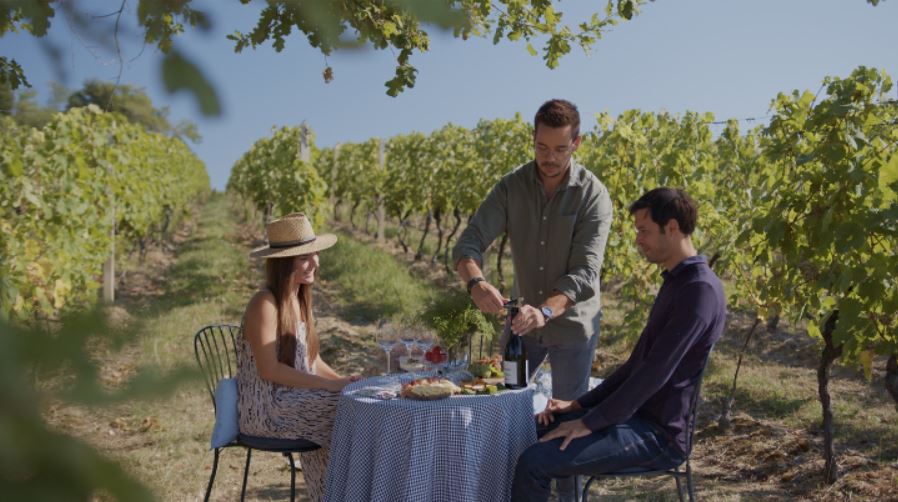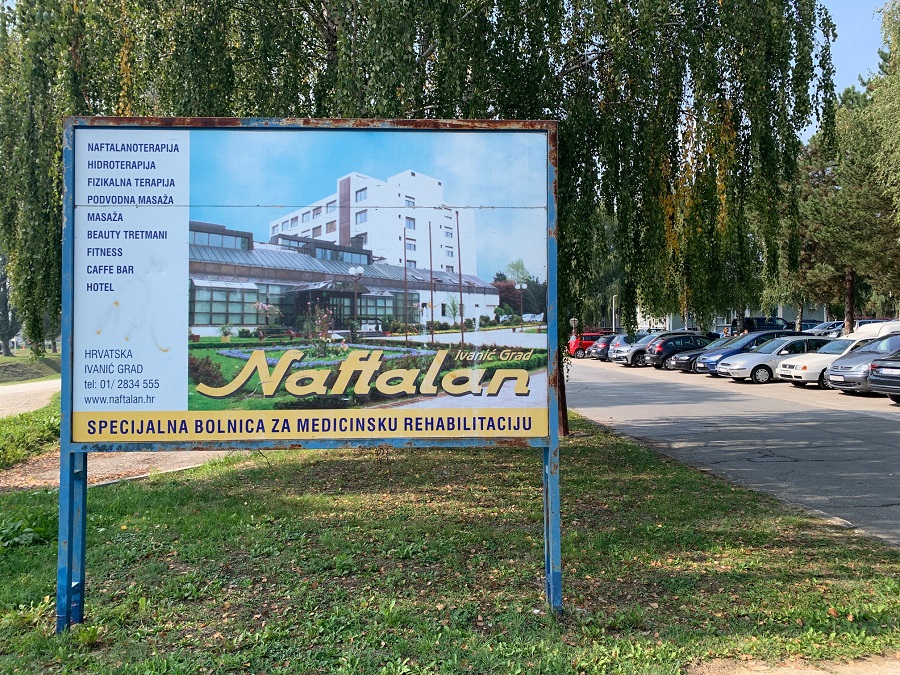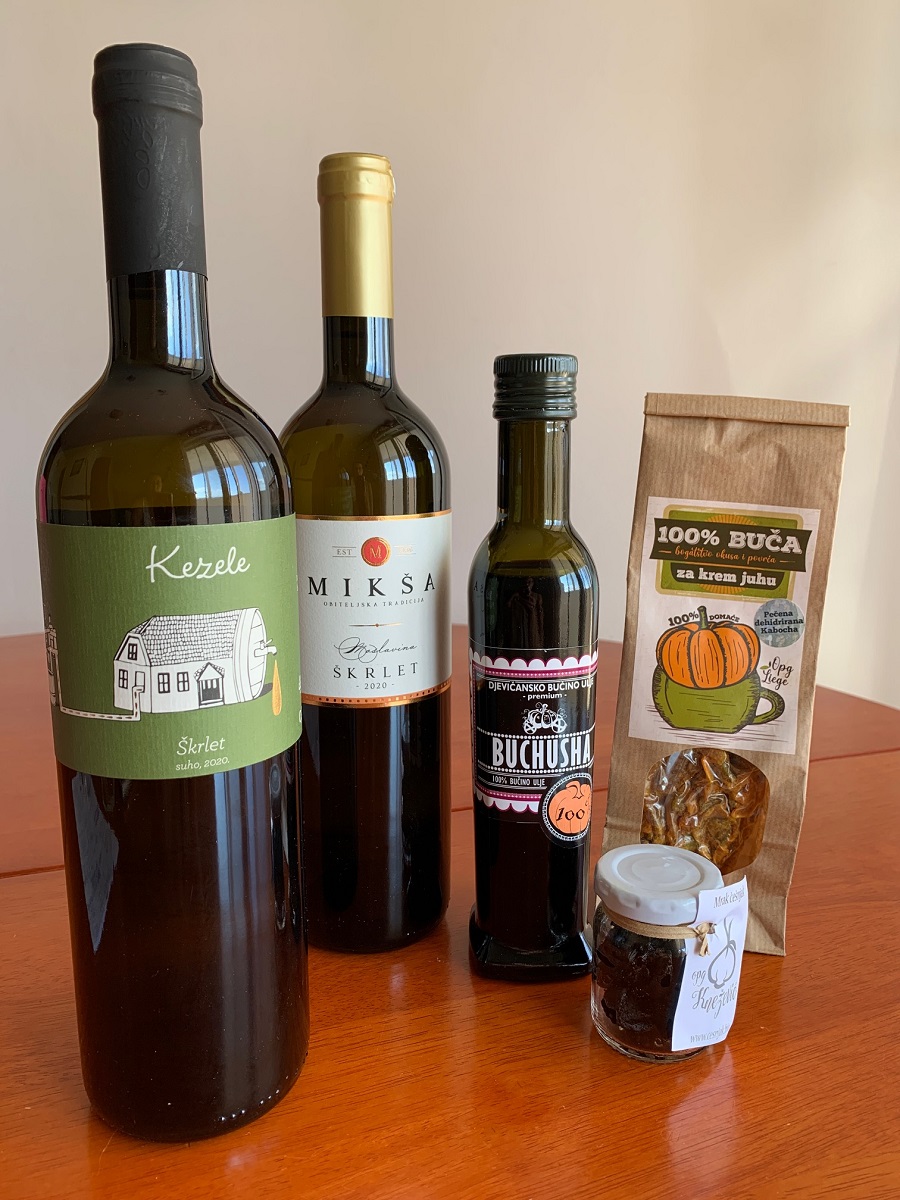Major Nomad List 2021 Survey: Croatia 2nd Most Liked, Zagreb in Top 5 Cities
October 11, 2021 - A major Nomad List 2021 survey of the travel and lifestyle habits of digital nomads has some encouraging news: Zagreb, Split and Croatia are officially hot.
Let's start with what the data is based on, as explained by Nomad List:
Remote work is now on an exponential trajectory and growing fast. With its growth, millions of people who are now newly working remotely from home, a cafe, or coworking space, will start to realize how mobile they've come and hit the road. In this report, we try to figure out who these nomads are, what work do they do, and how they spend their life based on data from tens of thousands of Nomad List members.
This page is generated live with data pulled straight from the database. Conclusions you can derive from this are always limited and merely indicative but possibly interesting. Nomad List is a paid membership community, which means there's a selection bias as people who do not or cannot pay are not in the dataset. On the other hand, free digital nomad communities, like on Facebook, require no commitment to join, therefore it's not clear if these people are merely aspirational or active nomads or not. On Nomad List we can confirm they are active based on their travel logs.
There are lots of interesting insights into the digital nomad lifestyle, which you can browse through on the link above.
Before we get to Croatia, here are some interesting - at least to me - findings. According to the survey:
80% not religious
66% are single
66% earn between $50,000 and $250,000 a year
12% are vegetarian
13% are vegan
Favourite activities are hiking, fitness and running
97% are vaccinated
88% had a happy childhood
The average stay in a country is 69 days
Only 7% of nomads stay in a location for a year, (which ties in with last month's TCN editorial Has the Croatian Digital Nomad Permit Been a Success So Far?)
And now, let's get to Croatia.
Most liked country - Croatia,number 2, after Japan.
Most liked city in the world - Zagreb, number 5, after Tokyo, Taipei, Mexico City and Cape Town
Most liked city by male nomads - Split, number 9
Most visited country - Croatia, number 27
You can see the whole Nomad List 2021 survey here.
For more news and features on digital nomads in Croatia, follow the dedicated TCN section.
2,500 Runners Compete in 29th Zagreb Marathon
October 10, 2021 - The 29th Zagreb Marathon was held on Sunday, October 10, with 2,500 runners!
Cool weather with temperatures below 10 degrees Celsius, dark clouds, and some rain created ideal conditions for Zagreb marathon runners on Sunday, reports Jutarnji List.
As a famous face on Croatian trails and roads put it:
"The weather was great!"
Tea Faber was among the 2,500 runners on Sunday morning at the start of the 29th Zagreb Marathon on Ban Jelačić Square and the first to cross the finish line in the women's competition. And with a personal record - 2:51:17. Men's marathon winner Ivan Dračar recorded the best result in his career, also the tenth of all time in Croatia (2:24:30).
Tea and Ivan were the main heroes of Sunday's event and the new champions of Croatia, but as the director of the Zagreb Marathon Marko Jakopović emphasized, this is not only a festival of top running but also the promotion of recreation and a healthy lifestyle. That is why after last year's 'corona break,' it was nice to see the river of runners on the streets of Zagreb again. The number was again limited due to that unfortunate pandemic, but the most important thing is that racing life is slowly returning to normal.
"A phenomenal feeling; this is my second marathon and second victory. Two weeks ago, I was the first in Split, now in Zagreb. The conditions were ideal, the track was flat, everything suited me," said Ivan Dračar, a 25-year-old from Imotski in the Zagreb Mladost jersey.
AK Dubrovnik member Tea Faber is a familiar face amongst Croatian runners because there is almost no weekend that you will not see her at a race.
"To win in your city, with a personal record and the title of Croatian champion, is indescribable. I love running; I live for sports; it’s my way of life."
It is worth mentioning the excellent marathon debut of the second-placed Petar Bratulić (2:26:32) and the eighth-place of Bruno Erent (2:37:58). He became the Croatian champion in the 20 km walk last Saturday; a day later in Budapest, he broke the Croatian record in the 35 km (2:55:49), and seven days later, he ran a marathon.
The 10 km runners were the first to start mastering the Zagreb asphalt, and the best were the members of AK Svetica Dorian Miškulin (30:29) and Olympian Matea Parlov Koštro (33:43).
"The temperature was even ideal, but that wind bothered me a lot. I tried to hide behind the other runners, but I was left alone at one point, so it was hard. I used this race as tempo training, considering I only did the first block of basic training. I am currently collecting a lot of kilometers, I am not doing anything fast, so I am satisfied," said the 21st marathon runner from the Games in Tokyo.
Her club colleague added: "I won, the personal record is there, so I have to be satisfied. Two years ago, I was second at 10km; as a kid, I ran 5km; I come every year, it’s a tradition. So now I have come to the first victory; I hope I will continue in that rhythm, ha-ha."
On Sunday, the only foreign winner was Kenyan Solomon Koech, the fastest in the half marathon (1:04:55). Among women, in first was Croatia's second Olympian Bojana Bjeljac, a member of Dinamo-Zrinjevac, who entered the finish line with a time of 1:12:04.
"When we went through Maksimir, the wind was blowing in my chest, and that slowed me down a lot. The trail has changed; there are more uphills, especially around British Square, which doesn't suit me. But 1:12 is solid as preparation for a marathon. Now we are continuing with the preparations, I have to fulfill the norm for the World (2:29:30) and European Championship (2:32.00), I will try to take off minutes in December in Valencia," Bojana pointed out.
To follow the latest sports news in Croatia, follow TCN's dedicated page.
To learn more about sport in Croatia, CLICK HERE.
Bridge: Zagreb Administration Dealing With Personnel, Instead of People’s Problems
ZAGREB, 9 Oct, 2021 - The Bridge opposition party's MPs and Zagreb City Assembly deputies on Saturday voiced concern over the situation in the Zagreb Holding utility conglomerate, saying that instead of dealing with citizens' problems, the city administration was dealing with personnel.
Speaking at a press conference, MP Zvonimir Troskot said the management and supervisory boards in city companies "are changing faster than trams drive" and that the city administration should start dealing with road construction, public transport, and waste.
He said the ZET public transport company was HRK 500 million in debt.
MP Marija Selak Raspudić said Bridge could not see why everyone appointed to a key position in the city was leaving the mayor and that she expected answers.
She also wondered why everyone working for the city was not allowed to speak in public without the administration's consent.
The party's City Assembly deputy Trpimir Goluža said the situation at the Srebrnjak children's hospital was an example of non-transparent management and of complying with political decisions "made within the close circle around Mayor (Tomislav) Tomašević."
He said the work of the hospital's governing council was secret and that it made decisions under Tomašević's influence, not based on expertise.
For more on politics, follow TCN's dedicated page.
For more about Croatia, CLICK HERE.
23 Prisoners at Zagreb's Remetinec Prison Infected, 110 Self-Isolating
ZAGREB, 8 Oct 2021 - Visits to prison inmates and persons in custody, notably those at Zagreb's Remetinec prison, have not been allowed over the past month due to coronavirus having entered the prison system, the Večernji List daily of Friday reports.
Inmates have also not been able to exercise their right to spend some weekends outside the prison system.
The Justice and Public Administration Ministry says the Prison Administration Department has been implementing a set of measures since the start of the pandemic to prevent the virus from entering and spreading in the prison system.
Under one of those measures, before prisons were last closed for visitors, only visitors who were vaccinated, had recovered from COVID-19 or had a negative test not older than 48 hours were allowed to make a visit.
Nonetheless, this did not prevent the virus from entering the system and according to this week's data from the ministry, 23 inmates and persons in custody at Remetinec are infected while 110 are self-isolating.
In the entire prison system, 27 inmates are infected and 127 are in self-isolation.
The ministry notes that no employees at Remetinec are infected or in self-isolation.
Since the start of the pandemic, 2,321 inmates and 1,598 employees in the prison system have been vaccinated.
The exact number of persons tested and infected in the prison system will be known once the report on the state and work of penitentiaries, prisons and correctional facilities for 2021 is released, the daily says.
For more news,CLICK HERE.
Via Vino: Zagreb Wineries Meet Autumn Art, Music, Food & Cinema
October 6, 2021 - Just a short drive from the Zagreb is part of Croatia's fantastic wine story. A new autumn initiative from the Zagreb County Tourist Board brings art, music, food and cinema to Zagreb's vineyards. Meet Via Vino.
One of the things that visitors to Zagreb often comment on is just how accessible it is.With its abundant parks, it is a great city to walk in.
Those who are a little more adventurous are discovering just how accessible - and fascinating - the region around Zagreb is. The launch of the Around Zagreb initiative last year, bringing the very best of the city of Zagreb, Zagreb County, and now also Zagorje, has added a new dimension to Zagreb tourism.
The Zagreb County Tourist Board has been particularly active in recent times promoting the authentic treasures of the region, as well as helping to bring the indigenous products of its producers to the market. One small example of this is the development of the Zagreb truffle hunt, something that perhaps even many locals are not aware of. Local producers are bying into the brand of authentic Zagreb County and its local products, and one can now enjoy Zagreb truffles in strukli, as well as pralines. And the latest Zagreb truffle delicacy was unveiled at the Via Vino press conference this morning - ajvar with black truffles.
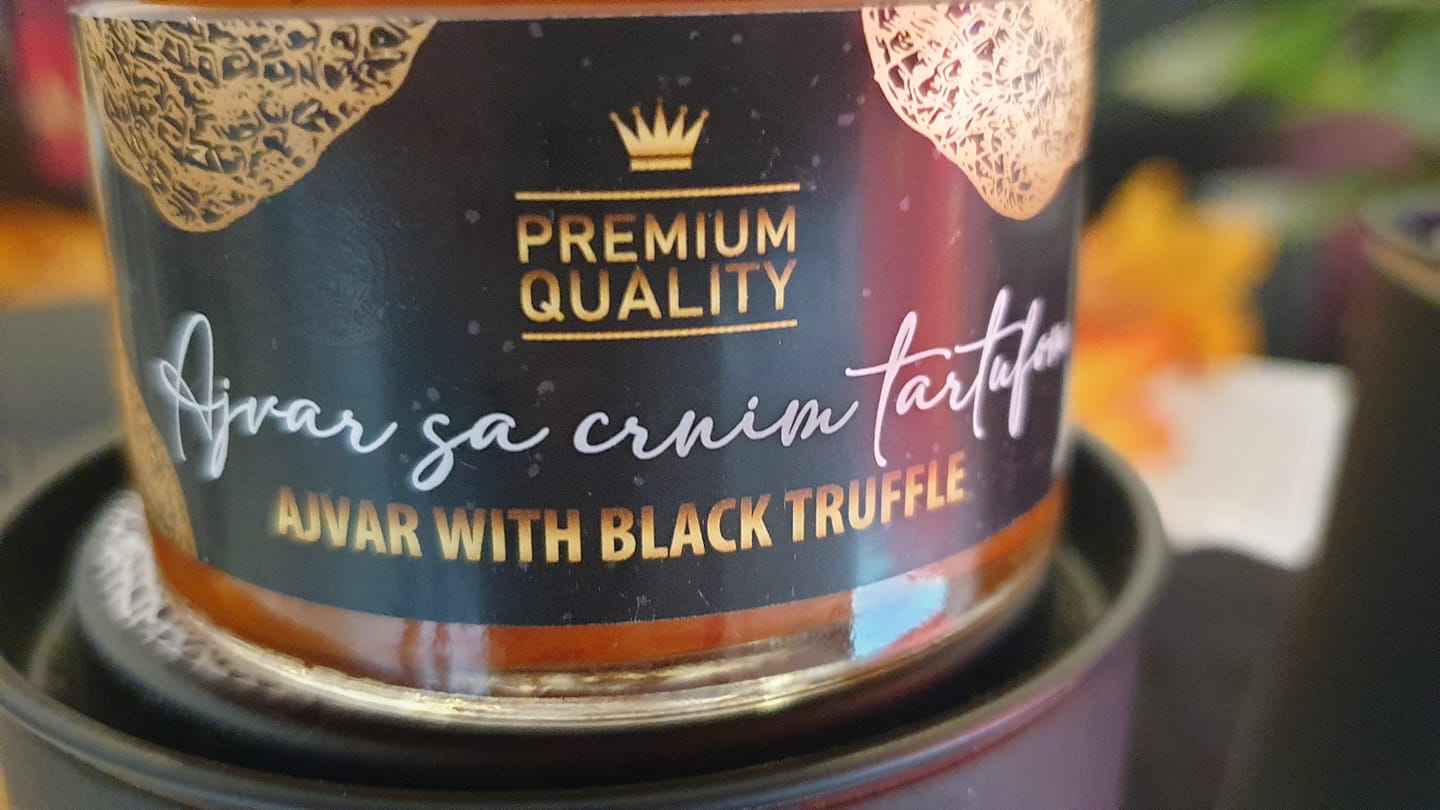
A new initiative called Via Vino has been launched by the Zagreb County Tourist Board, which was unveiled at a press conference in their office in Zagreb this morning, complete with new promotional video of the wine roads of Zagreb County. The Croatian capital is blessed with several wine regions surrounding the city on all sides - Sveta Ivana Zelina, Samobor, Jastrebarsko, Ivanic-Grad, and Zapresic.
From October 15 to November 15, the wineries of Zagreb County will be welcoming visitors to experience their wines, while also combining that experience with some signature events combining art, food, wine and music.
Via Vinaria takes place every Friday and Saturday within the month, when more than 50 wineries in Zagreb County will open their cellar doors for wine tasting. A great day out from the city, and a chance to enjoy the county's alluring nature while sampling its finest wines.
Looking to catch the latest Bond movie in some style? Via KINO is the place to be on October 15 at the Braje vineyard in Plesivica, where chestnuts and Portugiesac will accompany 007's final mission. Additional sustenance will be provided by Marin Medak and his Food Truck.
Via KINO will take place on October 23rd. in the central park of Velika Gorica. Although this is not a wine region, the screening of the film will feature an exhibition of photographs of winemakers, accompanied by homemade spirits by Brigljević distillates and gin. As this area is known for truffle hunting, you will have the opportunity to taste truffles in typically continental dishes.
Via VINO will also enrich the Via ART event, which takes you along the picturesque Samobor road of pleasures, with recognizable wines, selected delicacies and an exhibition in the vineyard! It takes place on November 6 and follows the well-known feast of St. Martin, patron saint of winemakers. Take a look at the exhibition of photographs of winemakers from Zagreb County in the Samobor Museum.
Have you ever experienced a classical music concert in a vineyard? A good wine is like a good concert, it lasts a short time, but it is remembered for a lifetime. It’s new in every sip and changes with each new note. Therefore Via NOTE on October 16 brings concerts to the fairytale environment of the falling slopes of the vineyards of the Schwartz manor in Nespeš, in Sv. Zelini. The atmosphere will be enriched by the offer of dishes from Food Truck by Marin Medak, as well as a selection of wines from the Litterarii winery.
"We all already know that Zagreb County is the green living room of Zagreb. It offers sustainable tourism, numerous outdoor facilities but also an unforgettable eno-gastronomic experience, 365 days a year," said the director of the Zagreb County Tourist Board Ivana Alilović.
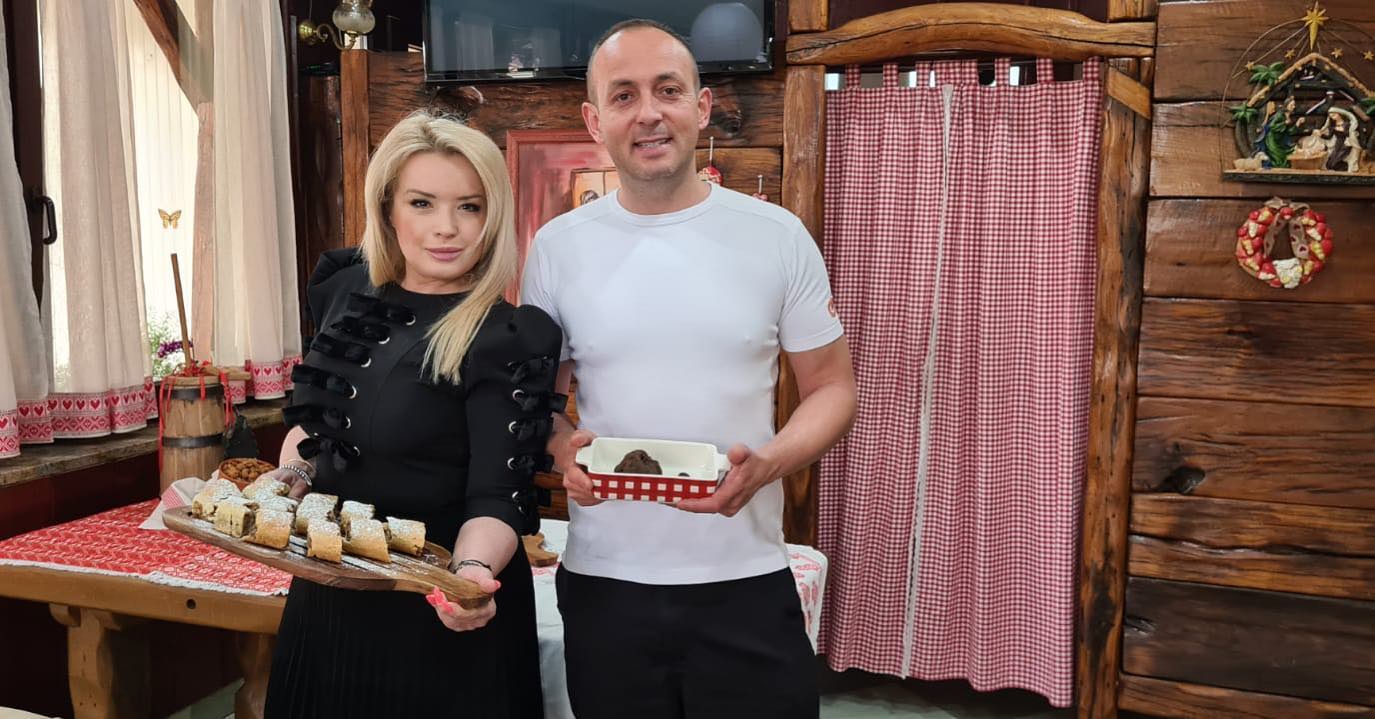
"As a year-round destination, it offers new facilities every season. Thus, our wine roads and events related to eno-gastronomic content are currently very attractive. The rich gastronomic offer and the increasingly strong development and branding of wine roads - from Plešivica to Zelina and Ivanić-Grad as the home of škrlet - are one of the strongest assets for the tourist and economic development of Zagreb County.
"We are proud that for the first time the Zagreb County Tourist Board is conducting such a large destination campaign in which over 60 key entities in the area of the Zagreb County wine scene are participating. For us, this is a big step towards positioning the entire Zagreb County as an authentic boutique destination."
For visits to wineries it is necessary to make an appointment in advance.
Admission to the events is limited, and for those who do not have a Covid passport at the entrance, a Covid test will be organized which is included in the ticket price.
The Via VINO event is organized by the Zagreb County Tourist Board, who you can contact for more information.
Split Set to Take Croatia's Busiest Airport Title in 2021
October 5, 2021 - Croatia's busiest airport will not be in the capital city this year, as Split Airport is set to transport the most travelers in 2021.
In September 2021, Split Airport accepted and dispatched more than 328 thousand passengers, which is 253 thousand more passengers than last year, and only 141 thousand fewer passengers compared to the record-breaking September 2019!
A few months ago, it was clear that Split will be the champion in the number of passengers transported in the Republic of Croatia this year, and this was confirmed on Monday by the publication of Zagreb airport statistics, which, despite the introduction of 15 Ryanair routes, remained below 200,000 passengers.
From January to the end of September, Split accepted and dispatched 1,363,413 passengers, which Zagreb is unlikely to achieve in the whole of 2021. However, given the number of weekly operations and available lines, a significant number of passengers in Split is expected in October.
Split Airport will deservedly take the title of the busiest Croatian airport at the end of the year after Zagreb Airport carried it for years.
By the end of 2021, Split will probably accept and dispatch more than 1.5 million passengers, which is less than in 2019, when there were 3.3 million, but there is no doubt that Split is on the right path to recovery and that will cross 2 million passengers again next year.
In other news, Dubrovnik Airport had more than 200,000 passengers in September this year.
Namely, 207,558 passengers passed through Dubrovnik Airport in September, as many as 166,000 more passengers compared to the same month in 2021. On the other hand, compared to September 2019, there were 50% fewer passengers (405,924 at the time). The largest share in traffic is made up of passengers from traditionally dominant markets - Great Britain, the United States of America, and France.
From January 1 to September 30, a total of 787,590 passengers traveled through Dubrovnik Airport, while in the same period last year, there were only 306,949.
Given that Dubrovnik will be well connected to several European destinations in October, a significant increase in the number of monthly passengers is expected to continue. Dubrovnik Airport will thus reach one million passengers by the end of this year.
Source: Croatian Aviation
For more information about flights to Croatia, follow the dedicated TCN section.
To learn more about Osijek Airport, click here.
Croatia Through the Eyes of a Digital Nomad: Fall Means its Bučijada Time!
October 4, 2021 - Americans say pumpkin, Croatians say bundeva. Americans eat pumpkin pie, Croatians eat bučnica. How a simple pumpkin festival reminded me to embrace cultural traditions and remember that finding what’s new and different is why we travel.
At a recent meetup for digital nomads in Zagreb, one of my colleagues mentioned the annual bučijada (pumpkin festival) starting the following day in Ivanić Grad, a town roughly 45 minutes outside of the capital. I squealed with delight. I love eating pumpkin in various forms and the pie (specifically, my mother’s creation) is one of my all-time favorite foods. Hers is the gold standard of pies everywhere, with its tasty filling, creamy texture, and moist crust. I look forward to this time of year for all kinds of pumpkin goodness, the only season when it’s available.
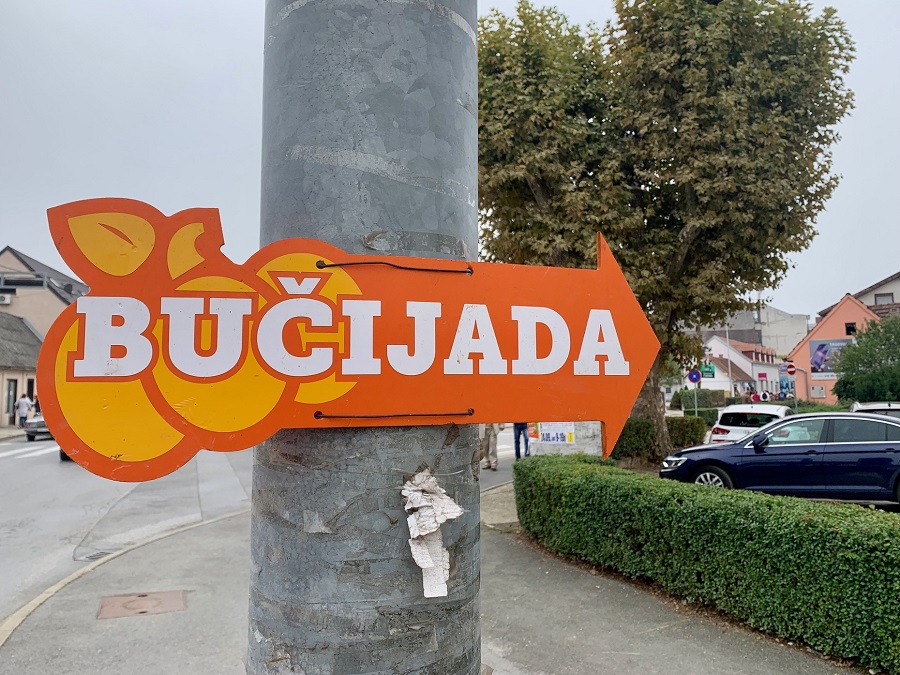
(The annual bučijada in Ivanić Grad, outside of Zagreb, is one of the town’s largest fall festivals.)
How fun would it be to sample Croatia’s versions of this fall favorite and pick up some new treats too?! What do they have here that’s different from what we have at home? As it turns out, quite a lot.
Consuming pumpkin
My stomach led as I walked off the train in Ivanić Grad the next morning. I met the wonderful Aleksandra, and asked where I could find pumpkin pie. “We don’t make that here,” she said. What about pumpkin bread, surely this bread-forward culture loads it into the bakeries? No again. Had I tasted bučnica? The savory pastry is a pumpkin strudel, popular in and around Zagreb, and made with pumpkin, fresh cheese, cream, and eggs wrapped in a thin dough. My first-ever serving there at the festival was pretty darn good.
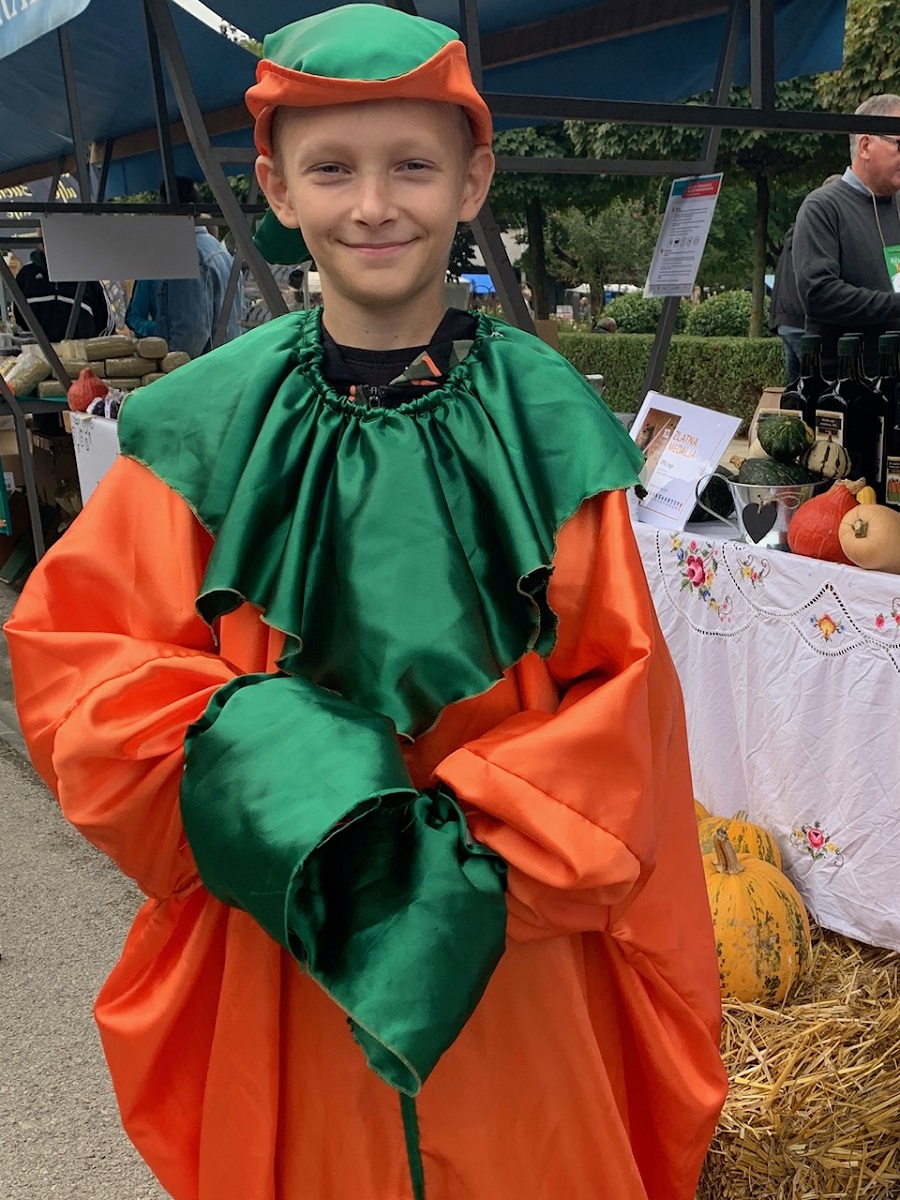
(The sweetest pumpkin at the festival was working the crowd near his family’s product table.)
Croatians love all sorts of fresh vegetables, why don’t they cook and eat more pumpkin? Because the squash is considered animal feed. So sad…
Fresh pumpkin seeds and pumpkin beer were abundant however, and pumpkin seed oil—bučino ulje—was the prize at the festival. An entire street was dedicated to OPG’s selling this nutty-tasting oil and other pumpkin products.
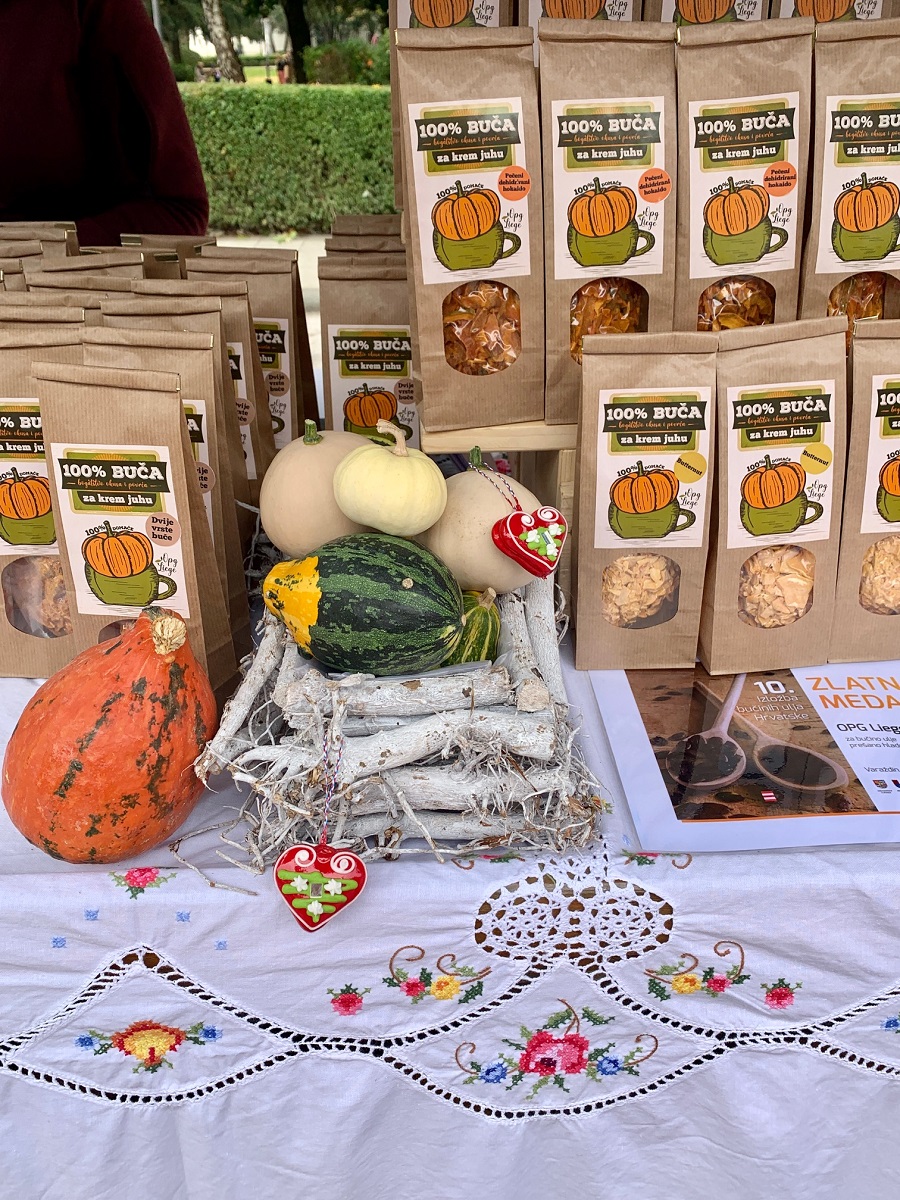
(A dried soup mix, made with 100% pumpkin, is a unique product.)
Pumpkin seed oil
Apparently, bučino ulje is a prestigious business, I noticed that several bottles displayed “winner” stickers. I knew why as soon as the oil hit my tongue—I was blown away by the flavor. I’ve had the store-bought oil and I will never do that again, there’s absolutely no comparison to Cro’s homemade product.
I was instructed on proper usage—don’t cook with the oil; only use it raw; cover food such as leafy greens and bean salad; drizzle it on strudel and vanilla ice cream; add to soups and stews for nutty sweetness. I’m pretty sure I’ll be sprinkling it on everything.
My disappointment over the pie was replaced with glee over the oil.
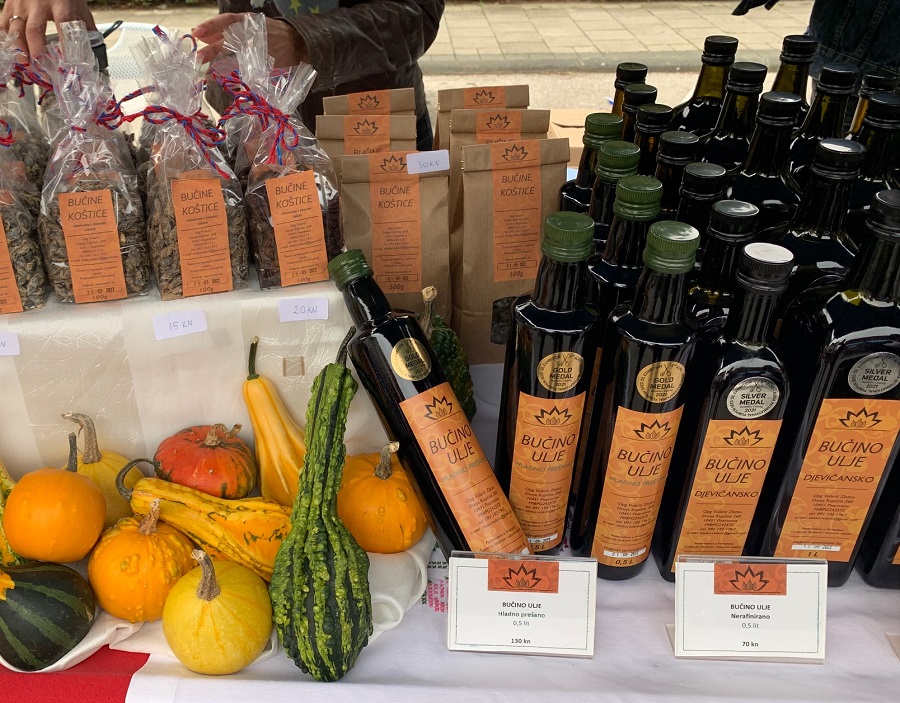
(Award-winning pumpkin oil, along with seeds coated in chocolate and other toppings, are frequently displayed on vendor tables.)
Eliminates wrinkles
Beyond trail mix and culinary applications, pumpkin seeds have serious medicinal credentials. They’re a rich source of vitamin E, zinc, omega 3- and 6- fatty acids, and antioxidants. In this regard, pumpkin seed oil is on par with Croatia’s other superfood—olive oil. It can improve heart health by lowering cholesterol and reducing high blood pressure. For us ladies, it’s an ingredient in skincare products that help hydrate the skin and eliminate the appearance of wrinkles. That right there is enough for me to gulp it.
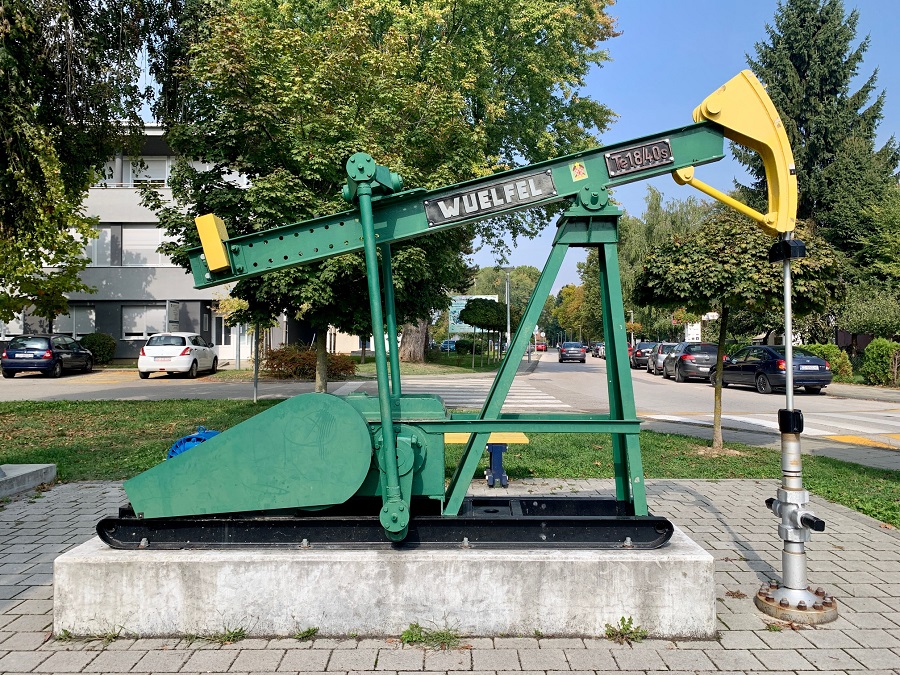
(Not far from the festival, INA’s oil drills can be seen around town.)
Black gold
I thought I’d seen what the town had to offer when things went in a different direction. Ana Gašparović, president of the Association of Heritage Friends and a local tour guide, educated me on Ivanić Grad’s “black gold.” It’s a designation given to the town’s three prominent native oils—pumpkin, petroleum, and Naftalan.
(The Naftalan Special Hospital for Medical Rehabilitation was built to treat skin disorders, specifically due to the discovery of Naftalan oil.)
Black oil began bubbling up from the ground in 1855, when it was pulled by hand. One hundred years later, after World War II, Germans led the first industrial production and oil drills can be seen around town. The headquarters of the oil and gas utility INA is located a few blocks from the festival, along with several other company buildings. Ivanić attracted the nickname “Little Kuwait” for its generous crude supply. Unfortunately, today it’s drying up and production will soon be shutting down.
Slightly further away is Naftalan Special Hospital for Medical Rehabilitation. The facility is dedicated to the treatment of inflammatory skin disorders, such as psoriasis, and features creams and bath oils made from the medical Naftalan oil. Ivanić discovered its natural resource of Naftalan in the 1980s, which is rare. Azerbaijan is the only other place on the planet where the oil is found.

(The integration of the medical and crude industries is represented in a graphic above the entrance to the Naftalan hospital. A snake and staff, symbolizing medicine, is combined with an oil rig.)
Yellow gold
Aleksandra joked with me that Škrlet is Ivanić’s “yellow gold,” a grape varietal that’s indigenous to the Moslavina region. Eight vineyards produce wine from the slopes of the Moslavačka gora Mountain. Janko Kezele, president of Škrlet Moslavina Association and one of the eight family producers, said, “We are proud to produce the wine as we nurture our tradition and identity of our region and our homeland.” Doing my homework for this story, I found it light, fruity, and rather likeable.
(Several items made it home in the author’s backpack: two Škrlet wines (by Kezele and Mikša); 100% virgin pumpkin oil by Bachusha; dried soup mix by OPG Liege; black garlic by OPG Knežević.)
A rural festival
The festival was spread out with multiple locations of vendors, activities, displays, a music stage, and food concessions, and it was packed with visitors. Ivana Alilović, Director of the Zagreb County Tourist Board, said, “We’re happy to have 200+ rural exhibitors participate in this year’s festival, especially during these times with covid.” It’s Ivanić’s biggest pumpkin festival yet and it’s got a lot to offer.
On the train
Riding the train from Ivanić back to Zagreb, I reflected on how a pumpkin festival broadened my perspective. My American brain recalled memories of pie, warm apple cider, and picking pumpkins from a patch. My Croatian experience was a cultural enlightenment that included bučnica, bučino ulje, Škrlet, and a cool history lesson on the town’s industry, plus I met some nice local people.
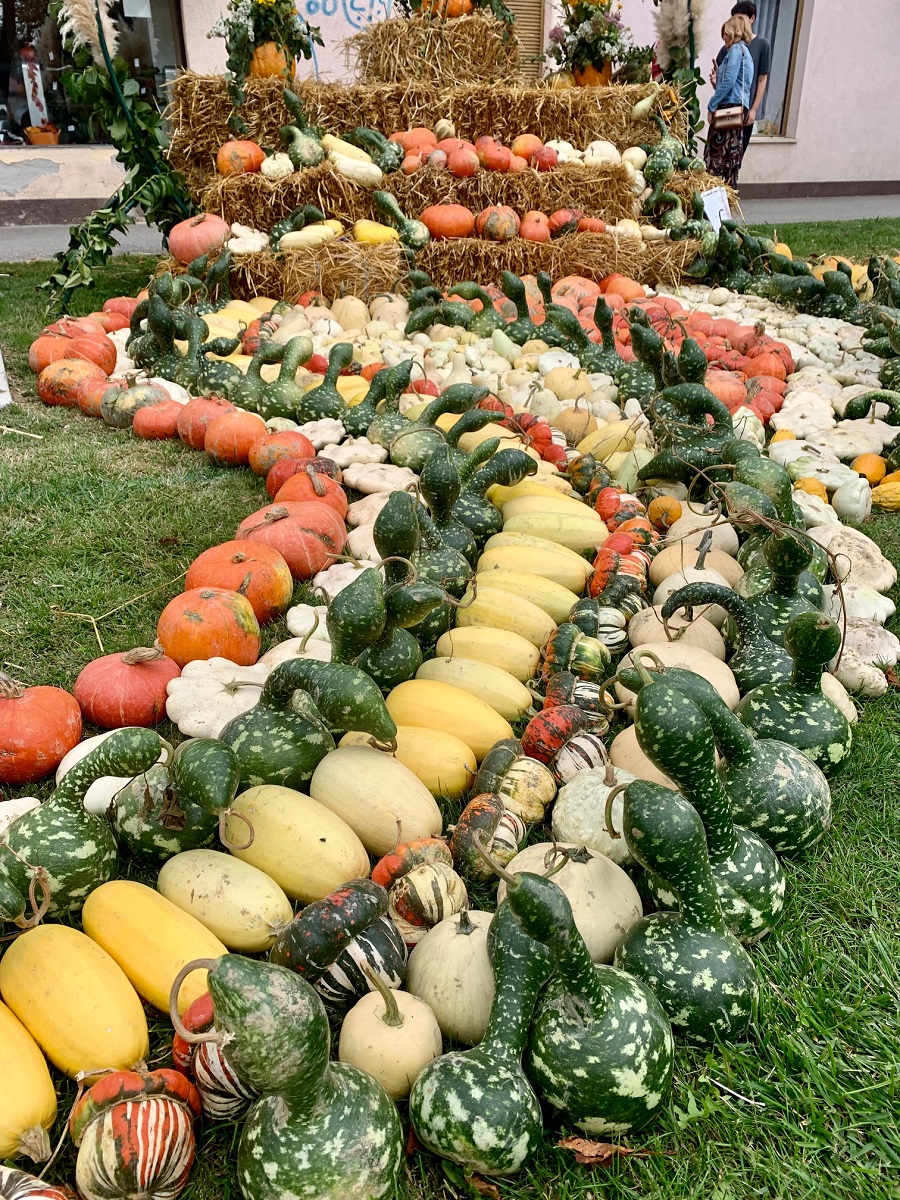
(It takes all shapes and sizes of gourds to make a colorful pumpkin patch.)
Story and photographs ©2021, Cyndie Burkhardt. https://photo-diaries.com
Learn more at TCN’s Digital Nomads channel.
Protest Against Vili Beroš and COVID Certificates in Zagreb This Morning
October 4, 2021 - Fifty protesters arrived this morning in front of KBC Zagreb to protest against Vili Beroš, Health Minister of Croatia, who came to the hospital at 7 am to mark the beginning of the application of mandatory EU digital covid certificates in health care.
In recent weeks, demonstrations against measures to combat the still current COVID-19 have increased in different parts of the country. In Krapinske-Toplice, for example, some parents gathered for several days outside a primary school to protest against the mandatory use of masks for children. It does not matter if the vaccination rate in Croatia is one of the lowest in Europe, it seems that the position of a large part of the citizenry is clear: no more restrictions.
On a larger scale, some massive protests have been taking place recently in Zagreb, mainly after the Minister of Health, Vili Beroš, announced that from now on health personnel in hospitals should present EU digital covid certificates in order to be able to work. The decision was not well received by a large section of the population, prompting both a large "protest for freedom" in Ban Jelačić Square, as well as a protest led by nurses and other health workers against the measure.
This morning, as Jutarnji List reports, around 50 protesters and opponents of the measure gathered in front of KBC Zagreb to protest against Vili Beroš and EU digital covid certificates. The Croatian Health Minister was in the middle of a press conference to mark the start of the measure. Among the protesters was a priest, Father Zdravko Knezević.
- ''Hangman, hangman!'', shouted the priest.
- ''Hitler's associates ended up on the gallows. Betrayal, betrayal! Judas' misfortunes!'', the priest continued and added that the pandemic was false.
He had a short conversation with Minister Beroš.
"You know everything well", he told Beroš.

A priest, Father Zdravko Knezević, was among the crowd who arrived to protest against Vili Beroš and confront the Health Minister. Photo: (Patrik Macek/PIXSELL)
The protesters, most of whom were citizens and a small number of KBC employees, did not allow Beroš to speak, chanting "shameful decisions", "betrayal" and "resignation", so the minister had to give a statement to the media at the hospital's Directorate.
"No beginning is easy. I allow the right to different opinions, however, in a situation where the virus has been around for a year and a half to deny its existence, numerous deaths and difficult situations are not justified. My task is to ensure the security of the health system and I will try to do so", said Beroš, referring to the protesters.
"As the Minister of Health, my task is to ensure the safety of all service users but also employees. Everyone has the same conditions, there is no discrimination. We do not force anyone to get vaccinated, but testing is what the profession considers the basic condition for safe work, and we do it for the sake of Croatian citizens and our patients'', he said.
As of Monday, every employee in the health care system and social care institutions in Croatia must have an EU digital covid certificate, as well as visitors and accompanying patients. All healthcare professionals who come to work from today must show a covid certificate, whether they have been vaccinated or have recovered from covid, while others must be tested twice a week.
Beroš reiterated that the measures are temporary and that they will change depending on the development of the epidemiological situation and vaccination. "It's not clear to me why someone doesn't want to be tested, why someone doesn't want to contribute to the safety of the health care system. What are their motives? I really can't understand them at the moment".
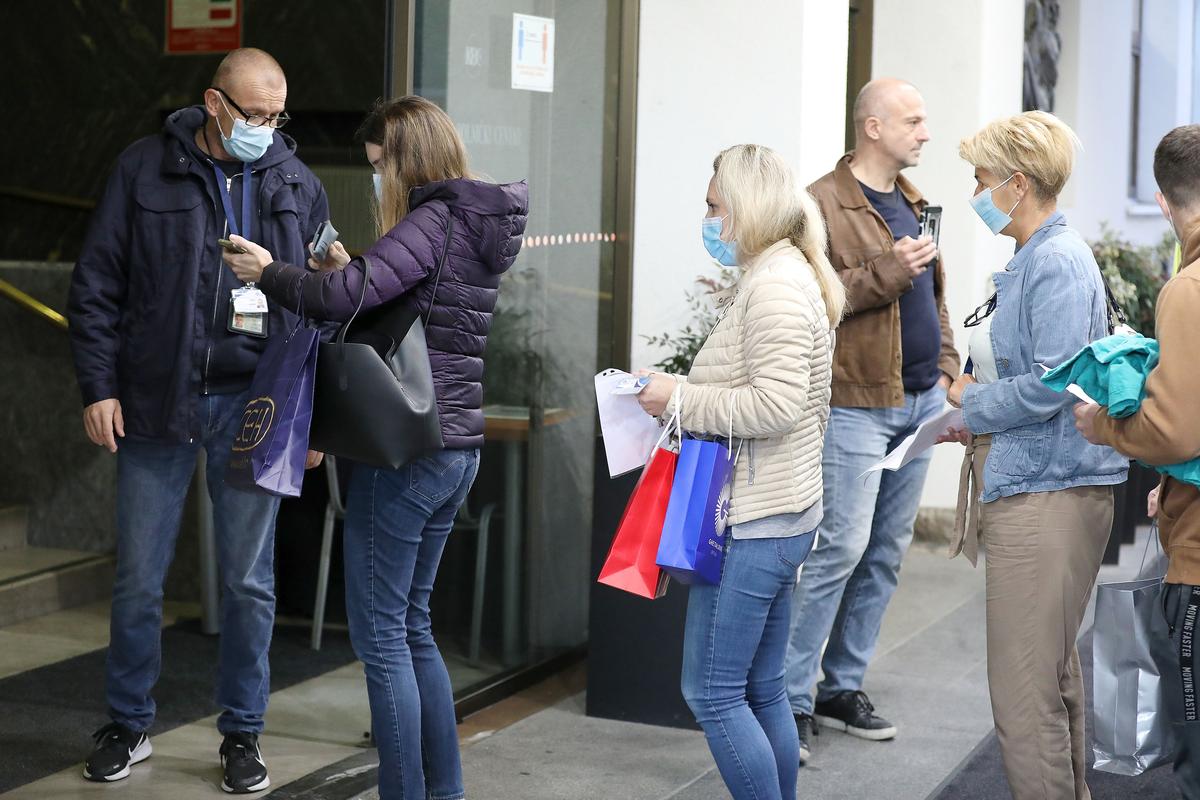
Despite the protest against Vili Beroš, most health workers arrived with their EU digital covid certificates in order to work at the hospital. (Photo: Patrik Macek/PIXSELL)
He said 10 tests revealed 10 asymptomatic positive patients in hospitals yesterday. "They would get into the system and be able to spread the virus, and we don't want that. Therefore, that also indicates that the measure is justified at this point."
He said that before making a decision on the introduction of mandatory covid certificates, legal experts on constitutional law were consulted and they believe that health protection is above all.
The director of KBC Zagreb, Ante Ćorušić, stated that the police were called to the protest against Vili Beroš and that most of this morning's protesters were not hospital employees.
Testing of health professionals who do not have a covid certificate at that hospital started yesterday and everything went well. To date, 690 employees have been tested and two have been positive. Vaccination within the KBC is relatively good, 81.5 percent of doctors and 56 percent of nurses have been vaccinated'', said Ćorušić.
"Most employees follow the procedure. The work process continues normally, the operating program goes on, the polyclinic works, the day hospital. Everything is as before", he said, adding that 12,000 people pass through the hospital every day.
As a reminder, as of Monday, every employee in the health care system and social care institutions in Croatia must have an EU digital covid certificate, as well as visitors and patient escorts.
All healthcare professionals who come to work from today must show a covid certificate, whether they have been vaccinated or have recovered from covid, while others must be tested twice a week.
For all you need to know about coronavirus specific to Croatia, make sure to bookmark our dedicated section and select your preferred language.
Croatian Graduate Perspective: The View from Matija from Zagreb
October 4, 2021 - With many young people emigrating from Croatia, what keeps those who decided to stay here (at least for now)? In the new TCN series called Croatian Graduate Perspective, we investigate recent graduates' attitudes about jobs and life opportunities in Croatia. Matija from Zagreb is our latest interviewee. This is his story.
1) First of all, please introduce yourself. What are you studying/what did you study? Do you have a job currently?
My name is Matija Šalat. I have a fresh Master's degree in political science from the Faculty of Political Science at the University of Zagreb. I'm currently employed by a multinational company in their business operations department.
2) What is it like being a student/recent graduate in Croatia during the pandemic?
I can say that the pandemic "hit" me much less than it did the rest of the student population. In 2020, I only had a couple of courses left in my second semester, which we did online, and this academic year I was writing my Master's thesis. The online form of teaching has its advantages, such as saving the time I would spend going to the Faculty. Still, the quality of teaching and the monitoring of the teaching, especially after all the efforts of the professors, isn't at the same level as ''live'' education is. Also, I think all young people share this opinion, that it was hardest for us to be separated from the people closest to us and dear friends in moments when human contact was more necessary than ever, but also dangerous as you could contract the virus.
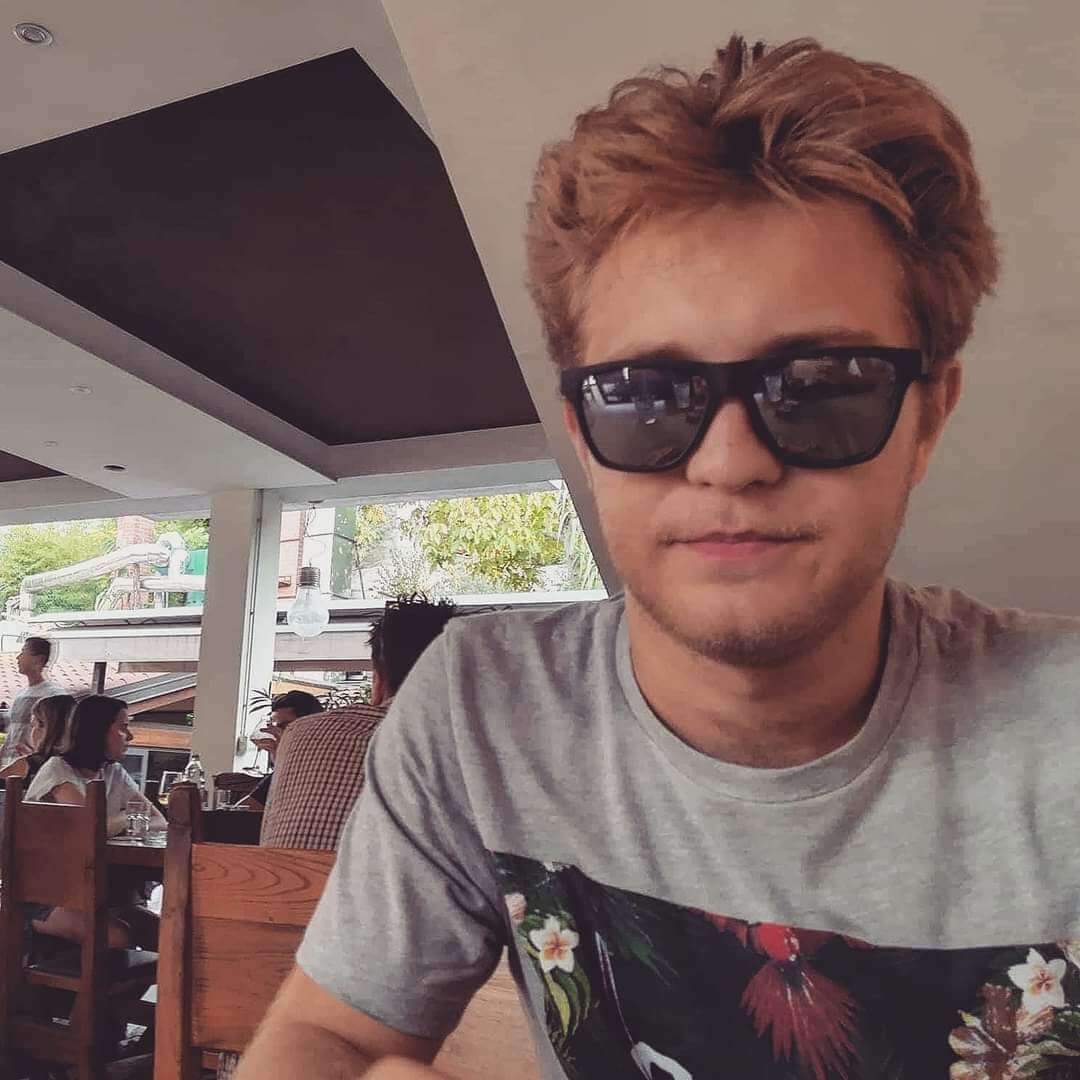
Matija Šalat © Matija Šalat / private archive
3) What are your experiences searching for a job in your profession in Croatia?
The labour market in the City of Zagreb is becoming more and more active every year, and the job offer is huge. Since we're a country where the last decade has been marked by economic hardships and the significant departures of young people abroad, the demand for a quality workforce is one of the major problems facing employers. There are actually three main areas of employment within my profession, namely; public administration, private consulting companies and the civil sector, as well as academic careers. As I recently got my Master’s degree, looking for a job in my own profession is my current priority. The Faculty of Political Science provides an extremely broad social education, and my interest is to find a place where I can further develop all of that, both in professional and personal terms.
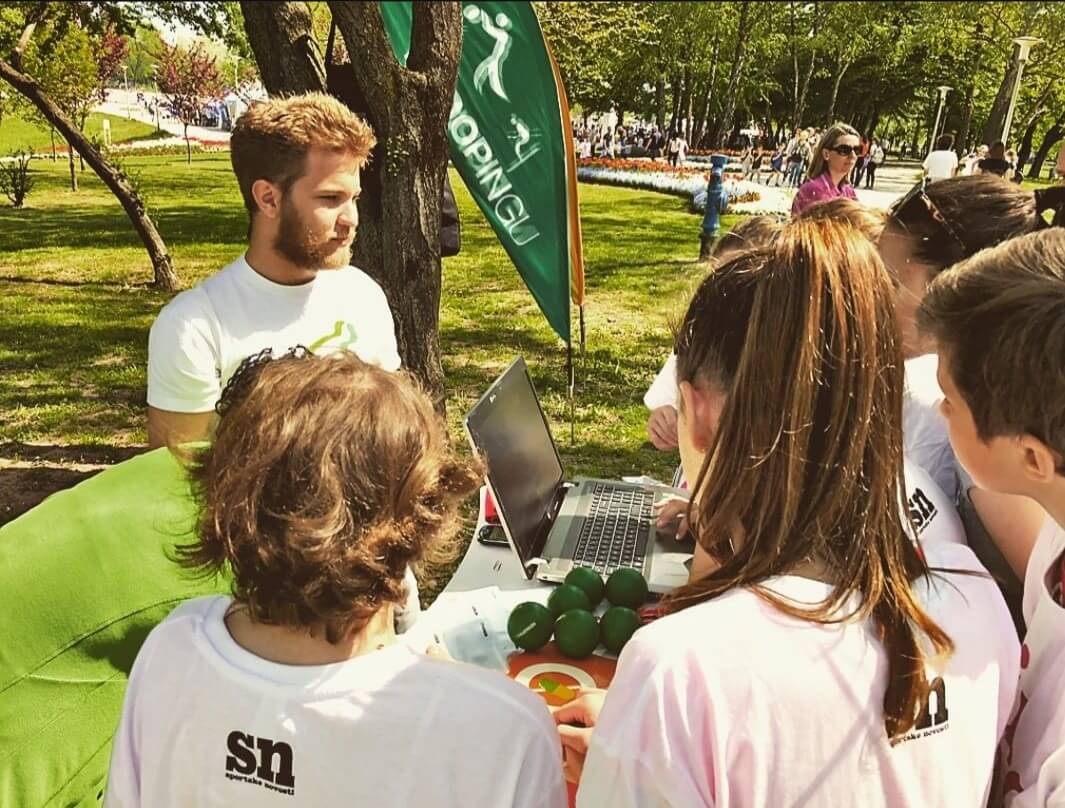
Matija on one of his jobs during studying © Matija Šalat / private archive
4) What do you think of the Croatian Government's efforts to provide opportunities for graduates?
I don't believe that the Croatian Government should be obliged to directly provide every young person with a job opportunity, but it is important to provide the private sector with a quality basis for creating business opportunities. And I don't mean fulfilling the wishes of the liberal part of the political spectrum on the abolition of taxes and regulations, but on setting the clear and consistent rules of the game. For example, I think a much bigger problem than the tax burden is that someone just won’t pay you for the work you’ve done, and the judiciary won’t protect you, or maybe the inspection will punish you drastically for a petty offense. We like to point out that the judiciary is the cancer-wound of our society, manifested precisely in legal uncertainty and inequality. So, there's not only one thing that needs to be done to make things better, but a drastic change in behaviour and governance is needed.
5) Many young people your age decide to emigrate from Croatia to find a better job opportunity and/or living standard. What do you think about that?
I absolutely understand every person who decides to build their life somewhere else, but at the same time, a large number of those who leave could help change our society for the better. The problem of the outflow of social capital should also be looked at because the vast majority of highly educated emigrants have had their education paid for by us as a community in order to contribute to its development. That said, I certainly support anyone who decides to take this difficult step, and I hope that rest of us will build a society that will be attractive to them again.
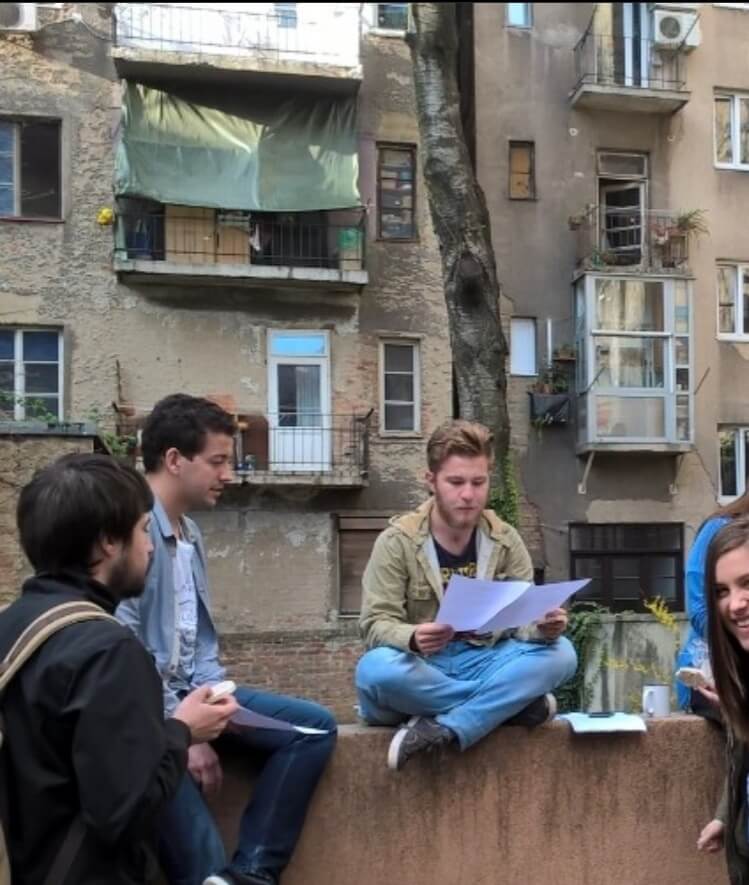
With friends at the Faculty © Matija Šalat / private archive
6) In your opinion, what would encourage young people to stay in Croatia?
The main problem of our society is the criminally bad governance of our country. A significant number of young people who left did it not only for economic reasons but also because it turned out that this country values political connections and acquaintances more than it cares about expertise and abilities. As all parts of the state apparatus are marked by inefficiency and corruption, the "little man" can only experience injustice. It's this sense of inferiority that the state produces, precisely this difference between a privileged part of the population who solves their problems with one call, versus people who have to solve the same problem over a prolonged period of time (and the question is whether they will be even able to solve it at all), that makes people go on a mission to find a more normal society. I have to admit that I was shocked when I heard from a friend that in Denmark, in order to receiving a student scholarship having part-time employment is a must and it isn't taxable. In our country, for example, until a few years ago, scholarship income was included in the non-taxable yearly limit of 15,000 HRK, which demotivated recipients in finding a job for fear of exceeding that limit.
7) Have you ever considered the option of leaving Croatia?
So far, I haven't even thought about leaving Croatia. Many of my acquaintances and friends went on to build their lives in other European Union member states, and I'm sure that they didn't regret that decision. Croatia is my home, and I'm bound by a great love for our country and optimism that things will change for the better.
8) As a recent graduate, what's your impression of the education system in Croatia? What do you think is good about it and what could be better?
The education system, in general, is extremely sluggish and resists any change that tries to improve it. It's a great thing that it's widely available and provides a very wide range of knowledge, but its inefficiency is manifested in poor management. An example of this is the University of Zagreb, which, under the current chancellor, ceases to be the pride of our higher education system and declines from year to year. The question arises, of course, about the responsibility of the entire academic community that tolerates such things, as well as a large number of scandals and bad decisions which made the largest and best university much worse than it was only a few years ago.
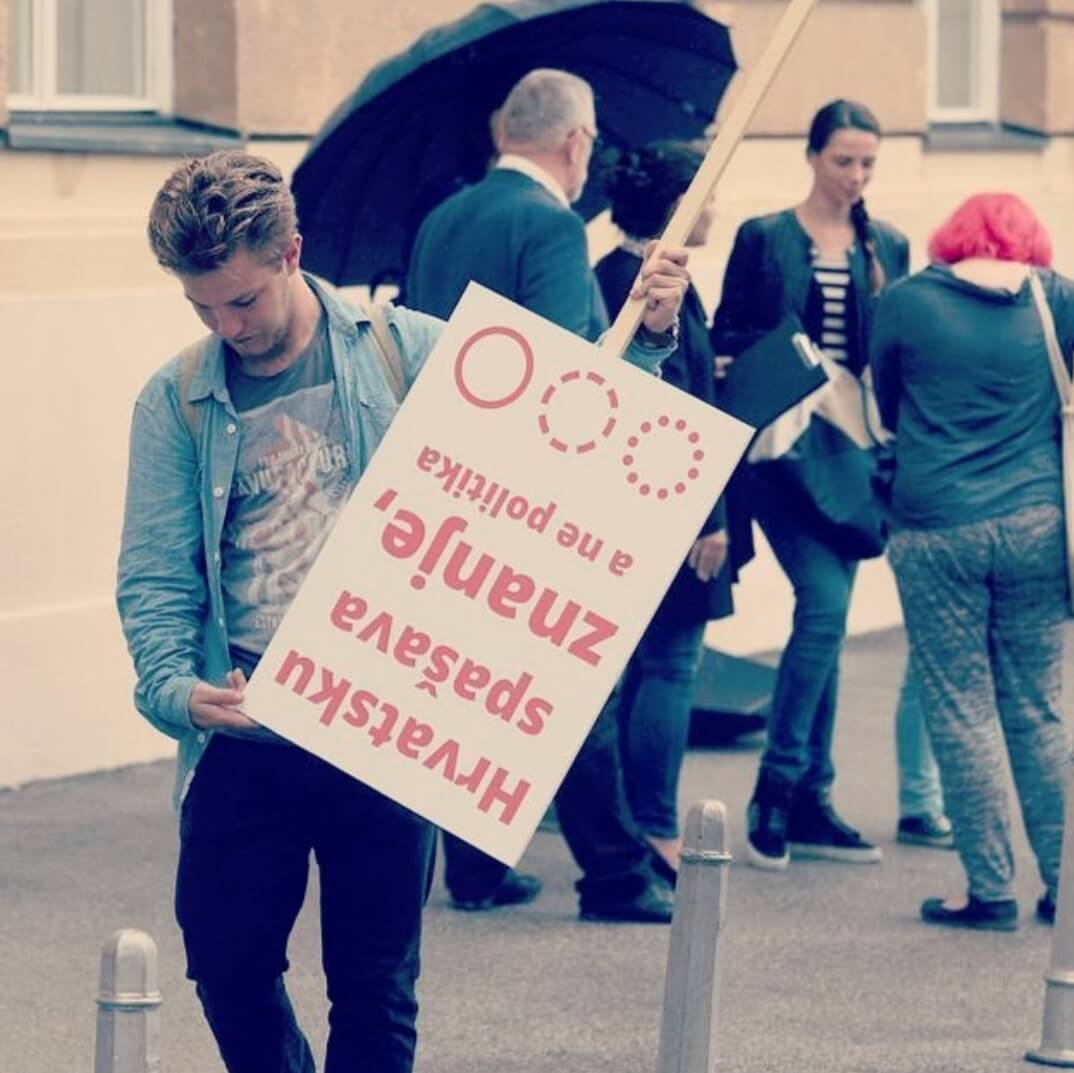
Matija during a student protest with a sign which reads: "Croatia is rescued by knowledge, not politics" © Matija Šalat / private archive
9) Based on your own experience, would you say that everything is possible in Croatia if you work hard, work on yourself, and are educated and ambitious?
To a much lesser extent than in the rest of Europe, but opportunities do exist, yes. The development of the IT industry over the past few years has provided a large number of well-paid jobs for which political connections aren't important. In addition to that, the lack of skilled labour for some areas clearly shows that within the private sector, this can go a long way. I think that we're starting to respect individual ability and effort a lot more than was the case in the last few decades.
10) If you could change only one thing in Croatia, what would it be, and why do you think it's important?
Although our society is marked by a lot of problems, if I had a magic wand, I would turn the judiciary into the total opposite of what it is today: reliable, efficient, and fair. An efficient judiciary would significantly improve our society, but more importantly, it would create a feeling among people that there are consequences for criminal behaviour, especially when it comes to corruption.
11) As a young Croat, what are you most proud of in Croatia? (if anything...)
I'm extremely proud of the beauty of our country, on every corner there is beautiful nature and historic heritage which is evident in a number of beautiful towns. I'm also proud of our sporting successes.
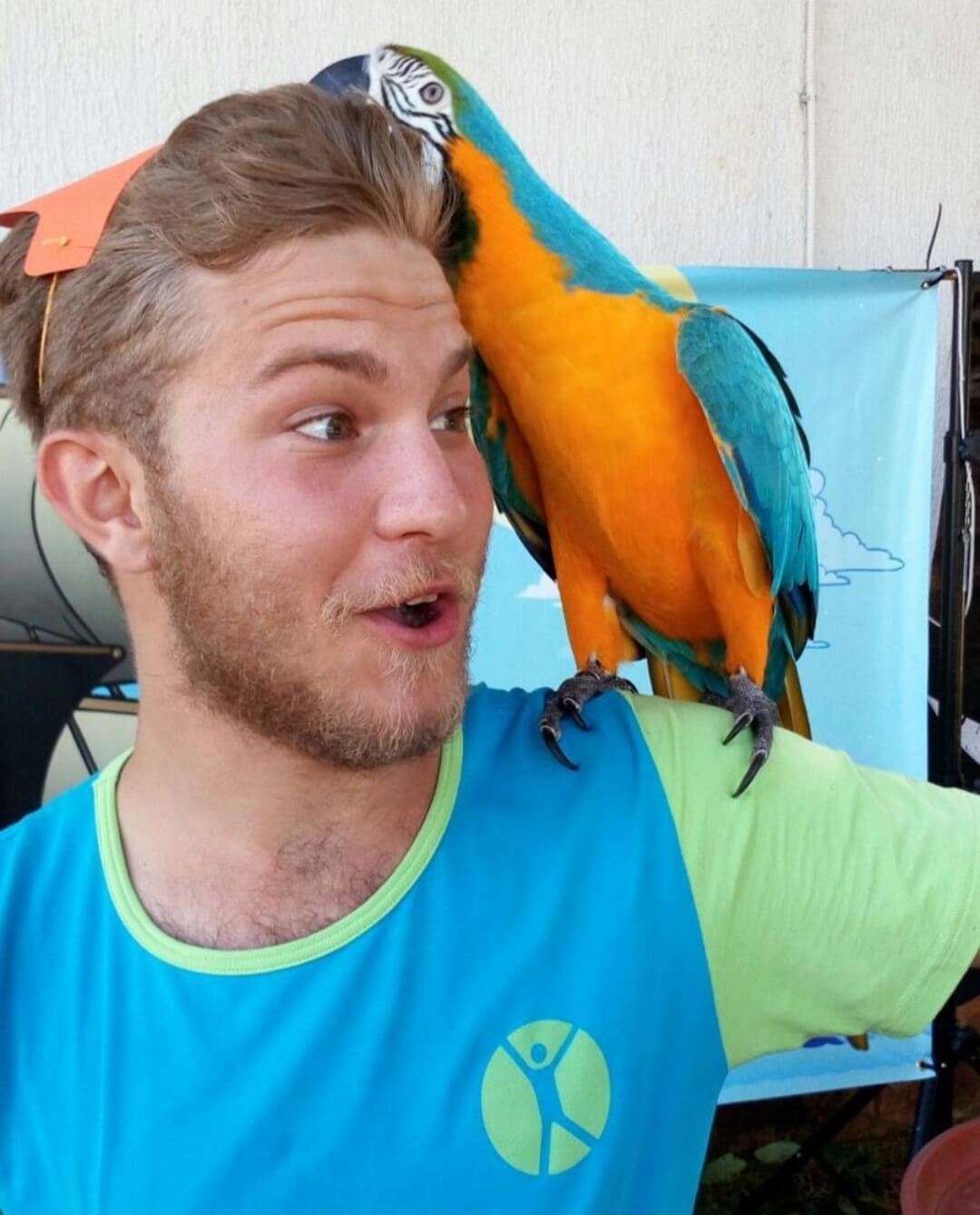
Matija enjoying life © Matija Šalat / private archive
12) Are you optimistic or pessimistic about the future of Croatia, will it be a better or worse place for your children?
I'm extremely optimistic about the future of Croatia. An important factor of my view is the emergence of new political options that may change the way this country is governed in the next few years. I hope that together, we will contribute to creating a healthier and happier environment for all of us.
To read more from the Croatian Graduate Perspective series, follow TCN's dedicated page.
For more about education in Croatia, follow TCN's dedicated page.
2021 CRO Race: Stephen Williams Named Overall Winner, Tim van Dijke Wins 6th Stage
October 3, 2021 - Briton Stephen Williams, a member of the Bahrain Victorious team, is the winner of the 2021 CRO Race which ended on Sunday.
In the last, sixth stage on the roads of Zagreb County and the capital, from Samobor to Zagreb (157.5 kilometers), Williams took second place behind the Dutchman Tim van Dijke (Jumbo-Visma) and thus defended the leader's red shirt in the overall standings, which he took over with a stage victory in Opatija on Saturday, reports HRT.
Up to six kilometers before the finish, Williams could ride comfortably in the main group, but after entering the last lap in the center of Zagreb, Van Dijke and Norwegian Markus Hoelgaard, second and third in the overall standings, had attacked, so Williams had to react.
The leading trio in the overall standings took the first three positions in the last stage, and in the final sprint in front of the Croatian National Theater, Van Dijke was faster than Williams, while Hoelgaard finished third with five seconds ahead of the peloton led by Australian Kaden Groves (Team Bikeexchange).
Williams eventually reached the biggest victory of his career, having won only one weaker stage race in France so far (Ronde de l'Isard 2018), with a 13-second lead over second-placed Van Dijke and 17 seconds ahead of third-placed Hoelgaard.
Apart from the stage victory in Zagreb and the second place in the overall standings, Van Dijke is also the winner of the competition for the best young cyclists and won the white T-shirt.
The blue T-shirt intended for the best sprinter was worn by the Dutchman Olav Kooij (Jumbo-Visma), while the green T-shirt for the best climber was won by the British Simon Yates (Team Bikeexchange).
Bravo for another world-class cycling event!
To follow the latest sports news in Croatia, follow TCN's dedicated page.
To learn more about sport in Croatia, CLICK HERE.



